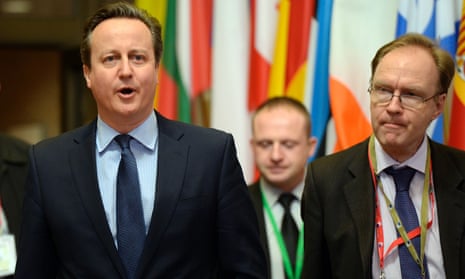The unexpected and abrupt resignation of Sir Ivan Rogers from his post as Britain’s ambassador to the European Union is a blow for Britain. He was widely regarded as having the right experience, deft touch and nous to navigate the shoals and shifting currents of continental politics that would buffet the British ship of state as it left its European berth. In going early Sir Ivan will have not helped Theresa May with her Brexit plans. Although he was going to leave by October, his exit – ahead of key elections in France and Germany – means the UK has lost one of its top negotiators just as we were meant to get down to the serious business of leaving Europe.
Sir Ivan was an insider’s insider. He was the government’s top Europe adviser at David Cameron’s side throughout Britain’s EU renegotiation, where some accused him of pusillanimity in the face of Brussels intransigence. In an email to colleagues Sir Ivan says it’s best to go before article 50 is invoked. Personal contacts and networks cultivated over decades will be lost. He was also a seasoned Westminster operator described by Ken Clarke, under whom he worked in the Treasury, as an “excellent British diplomat”. But such a recommendation, coupled with his cautious style, earned him the ire of Brexiters. While Mrs May consulted him on Brexit strategy, Sir Ivan’s relations with some of the prime minister’s team had reportedly begun to deteriorate in recent months. Last month Sir Ivan’s advice to Downing Street was leaked. In it he suggested it could take a decade for the EU to agree and ratify a comprehensive trade deal with Britain. Pro-Brexit MPs accused Sir Ivan of being a “gloomy pessimist”. The Daily Mail reported that “knives were out” for him.
Sir Ivan may have found it hard to blow up bridges he had built with European neighbours. But we are in dangerous territory if we as a country allow the people we ask to bat on our behalf to be silenced because of a perceived viewpoint. What if the thought settles that, if the UK doesn’t get the deal Brexiters want, it will be the diplomats who get blamed? Do we risk being pushed into a hard Brexit for fear for speaking truth to power? Feelings are running high: a former Treasury chief tweeted that this was a “wilful and total destruction of EU expertise”. The government needs to quash the idea Sir Ivan paid a price for telling ministers unpalatable truths. There has to be room for civil servants to offer blunt, unvarnished advice to ministers without the fear of being seen as too pro-EU and defeatist. Sir Ivan pointedly called on colleagues to “challenge ill-founded arguments and muddled thinking” and deliver “disagreeable” messages “to those who need to hear them”.
There is a structural problem with Sir Ivan’s present role: it has a dual reporting line to both Brexit secretary David Davis and foreign secretary Boris Johnson. The Institute for Government warned that “this will need to be managed carefully to avoid confusion and conflict”. The advice went unheeded but thought will need to be given to it to avoid future turbulence. This is the time for Mrs May to stamp her authority over the way Brexit is being run. Silence is not a strategy. There need to be options for MPs to discuss and an internal analysis so that ministers have a robust basis for the political choices they will need to make. All this when, as Sir Ivan notes, we are short on multilateral negotiating experience but Europe is not. Bizarrely the appointment of Sir Ivan’s replacement will tell us more about the kind of politics, diplomacy and trade that Britain will seek in the negotiations with the EU than Mrs May’s gnomic utterances. Sir Ivan’s successor will need a deep insight into the way Brussels works and have the trust of European capitals. He or she will also need the confidence of the prime minister. The message that Downing Street will send with the appointment of Britain’s person in Brussels will be critical: not just to Whitehall but to the rest of Europe as well.
